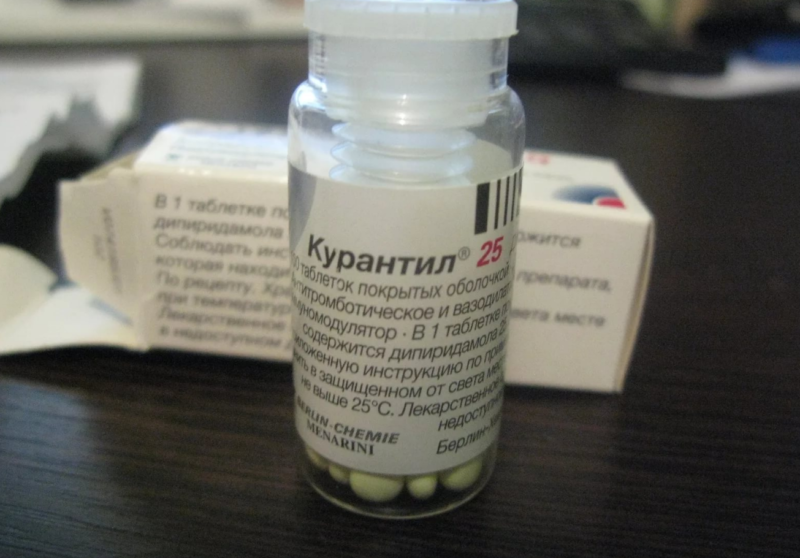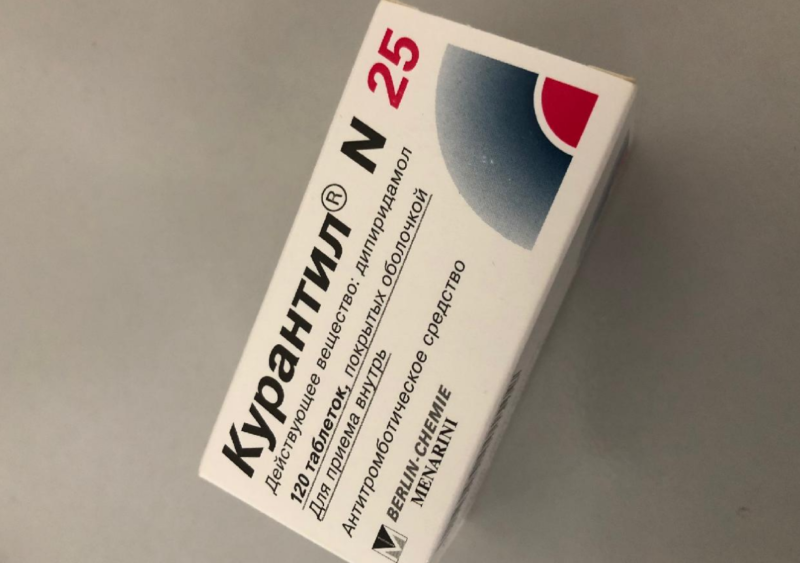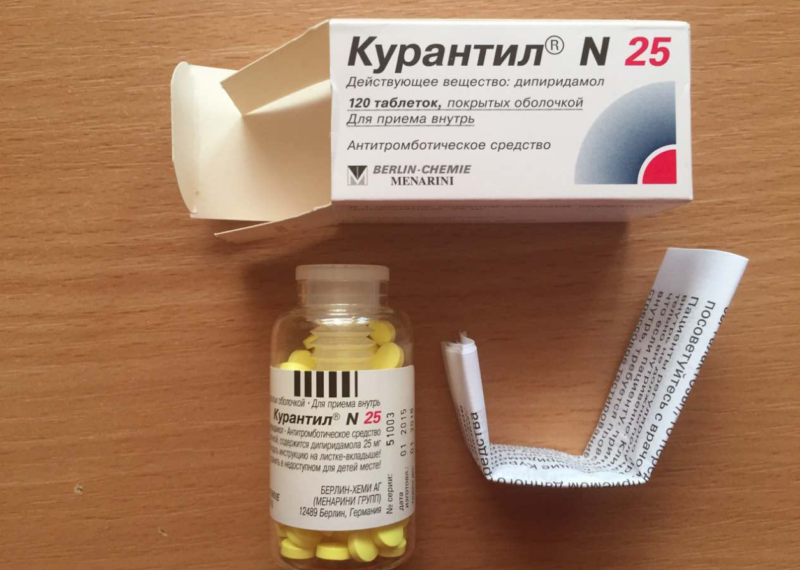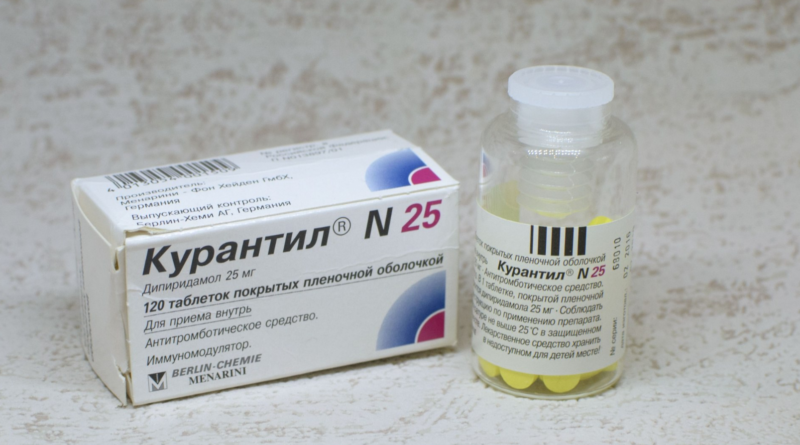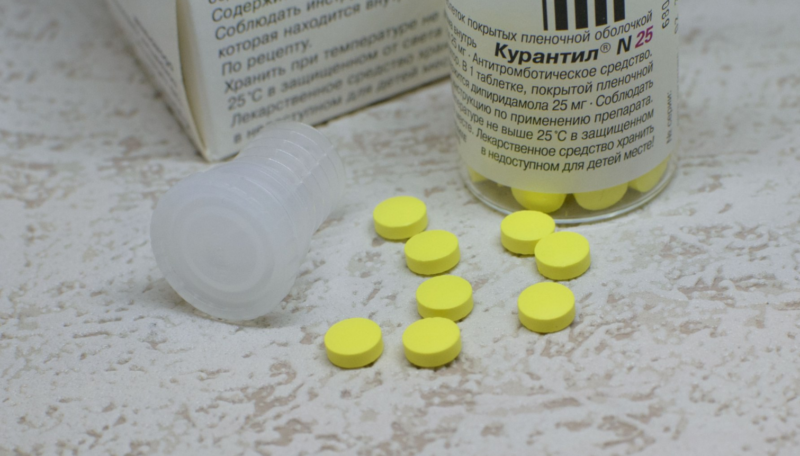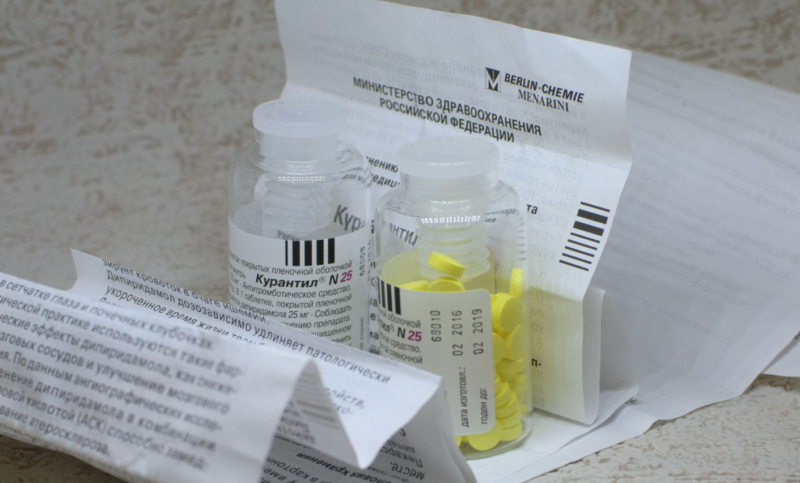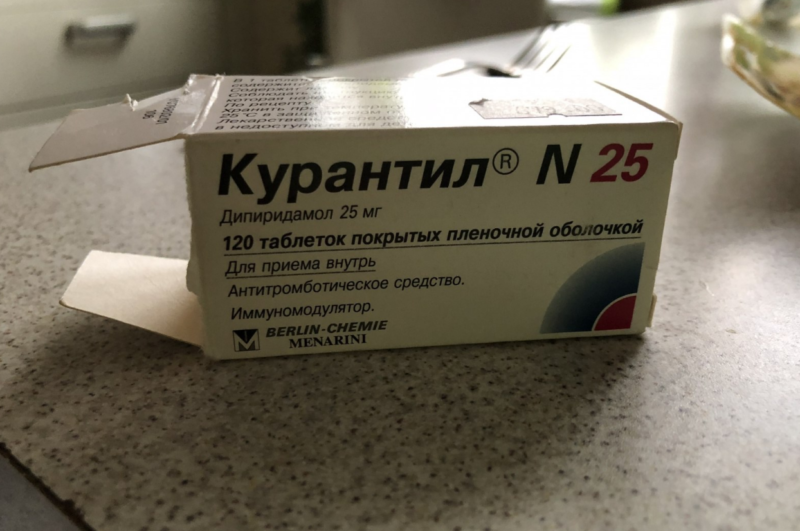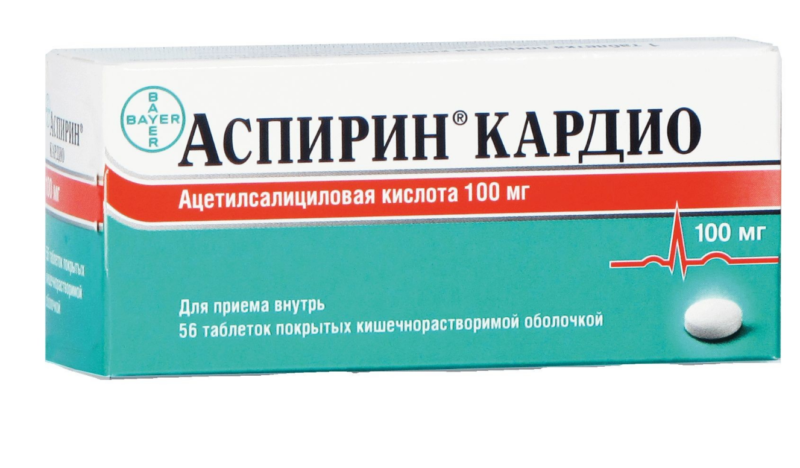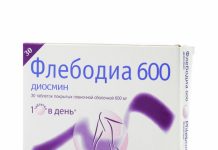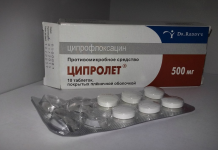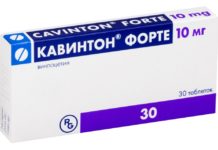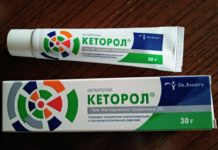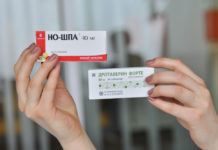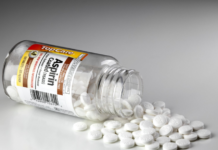The hasty rhythm of life and addiction to bad habits necessarily affect the health of the human cardiovascular system. Various drugs help reduce the negative impact and cope with the problem. Curantil is an innovative drug that has proven itself in the treatment of cardiovascular disorders.
Material Content:
- 1 Description of the release form and composition
- 2 Pharmacological action, pharmacodynamics and pharmacokinetics
- 3 Why is Curantil prescribed
- 4 Instructions for use and dosage
- 5 During pregnancy and lactation
- 6 Alcohol compatibility
- 7 Drug interaction
- 8 Contraindications, side effects and overdose
- 9 Analogs of Curantila
Description of the release form and composition
The main active compound of this drug is dipyridamole - a substance whose action is aimed at the expansion of blood vessels. And also in the composition of the medicinal product there are a number of additional compounds: macrogol 6000, lactose monohydrate, povidone, titanium dioxide, hypromellose, magnesium stearate.
For the convenience of patients, Curantil is available in several dosage forms at once:
- tablets - 25, 50, 75 and 100 mg;
- dragees - 25 and 75 mg;
- intravenous solution - 0.5% (0.01 g).
The tablet form is sold in cartons of 40 pieces each and has a yellowish color. Dragees can be purchased in glass containers of 100 pieces. The solution is contained in transparent glass ampoules.
Pharmacological action, pharmacodynamics and pharmacokinetics
Curantil is part of the group of antiplatelet drugs, the main task of which is to prevent the process of thrombosis.This pharmacological property is due to the fact that antiplatelet agents are able to reduce blood coagulation, due to which a preventive effect occurs. The main compound blocks the biochemical processes that are the main cause of the formation of platelet aggregates. Thus, platelets do not stick together and do not form blood clots.
A feature of the main component is that it does not affect large vessels and arteries. In addition, Curantil acts as an immunomodulator, since it significantly enhances the body's resistance to the effects of negative environmental factors.
Dipyridamole affects the synthesis of interferon, increasing its resistance to viral infections.
It is also worth noting that Curantil is characterized by a vasodilating effect. The main mechanism of this pharmacological effect is vasodilation, suppression of adenosine uptake and a decrease in the tone of the vascular wall, due to which the lumen widens. In the future, this has a significant effect on the speed of blood circulation, as well as oxygen saturation of the heart.
The maximum saturation with the main compound is observed one hour after the oral route of administration. This medicinal product has an accumulative property, concentrating in tissues and red blood cells. There is a process of metabolism of substances in the liver. Excretion is carried out mainly through the renal system, but part - with bile.
Why is Curantil prescribed
Antiplatelet drugs play an important role in the practice of treating cardiovascular diseases.
The main indications for which it is advisable to use Curantil are the following cases:
- Circulatory disturbance in the brain.
- SARS or influenza (Curantil 25 mg is used).
- As a complex treatment for pathologies of microcirculation.
- Prevention of coronary heart disease.
- Thromboembolism.
- Encephalopathy
- Prevention or therapy of thrombosis.
- Preventive therapy or treatment of oxygen deficiency in the brain.
- After a heart attack.
- With disorders associated with atherosclerotic plaques in the vessels.
- Arterial hypertension of the second stage.
Quite often, a drug acts as an enhancer of interferon due to its immunostimulating properties. Qurantil is often prescribed as an independent drug or it can be part of the complex treatment of various vascular disorders.
Instructions for use and dosage
A vasodilating agent is prescribed, as a rule, after passing a medical examination and consulting a doctor. Based on individual indicators, a therapeutic course is compiled. Tablets and pills should be used before meals with a glass of liquid.
Standard dosage in individual cases:
- In the period of seasonal diseases, as well as for the prevention of acute respiratory viral infections, patients are shown 25 mg Curantil tablets twice a week.
- Patients with coronary artery disease are advised to take one 75 mg tablet every eight hours. For the prevention of thrombotic formations, take up to 5 tablets per day. The maximum dose per day is 450 mg.
- Curantyl during pregnancy to prevent complications is prescribed in three tablets of 25 mg per day.
- In order to reduce platelet aggregation, the recommended dosage is up to 225 mg per day. The amount of the drug is divided into several doses. In severe cases, the maximum dose is 600 mg.
- In the case of impaired circulation in the brain, 75 mg of the drug will be required up to 5 times per day. With the parallel intake of anticoagulants, the maximum daily amount of a therapeutic agent is 300 mg.
This remedy is not used to treat patients under 12 years of age.In some cases, dosage adjustment, which the attending physician should carry out, will be required.
During therapy, care should be taken when driving a vehicle and operating complex mechanisms, as pressure and dizziness may decrease.
During pregnancy and lactation
Curantyl is often recommended for use during pregnancy. The use of this drug during the period of gestation is a preventive therapy for blockage of the placental vessels. Thus, the risk of developing complications in the fetus, which may be associated with hypoxia, insufficient oxygen saturation of the cells, is significantly reduced. And also this drug is in demand for placental insufficiency, gestosis and fetal malnutrition.
During therapy, lactating women should abandon breastfeeding.
Alcohol compatibility
With therapeutic treatment, Curantil is highly not recommended to use alcoholic beverages, because they contain ethanol. Otherwise, the risk of complications and serious side effects increases significantly. And also minimizes the pharmacological properties of the drug. At the same time, possible violations associated with renal function are not excluded.
Drug interaction
Teas, coffee and medicines included in the xanthine series can adversely affect the vasodilating properties of Curantyl. Antacids can also reduce the effectiveness of the drug. The risk of bleeding significantly increases when combined with Aspirin, Heparin and anticoagulants. The risk of blood clots increases co-administration with acetylsalicylic acid and NSAIDs. It is worth noting that Curantil enhances the effect of drugs whose action is aimed at lowering blood pressure. Cephalosporins can also enhance pharmacological properties.
Contraindications, side effects and overdose
Before using the drug Curantil, it is recommended to carefully study the instructions for use, since it lists absolute contraindications.
The medicine should not be taken in the following cases:
- Impaired liver or kidney function.
- Low blood pressure.
- Atherosclerosis of the coronary arteries.
- Personal intolerance to certain components.
- Severe obstructive pulmonary disease.
- Heart muscle dysfunction.
- Angina pectoris.
- Complicated hypertension.
- Aortic stenosis.
- Diseases that can cause bleeding.
- With a disturbed rhythm of the heartbeat in a severe form.
- In children under 12 years old.
And also in some cases, dosage adjustment and constant monitoring may be required.
Adverse reactions that may occur due to intolerance to the composition:
- jumps in blood pressure, dizziness, tachycardia;
- rush of blood to the face, a rare rhythm of the heart, tinnitus;
- pain in the stomach, bouts of vomiting, indigestion;
- decreased blood coagulation, bleeding;
- rashes, itching, and skin burning;
- muscle discomfort and aches in the body.
In the case of the tablet form, adverse reactions occur less pronounced. However, with strong manifestations, you should stop taking the medicine.
If the patient significantly exceeds the admissible norm of Courantil, the possibility of an overdose is not excluded. In this case, the following symptoms are observed: decreased pressure, weakness, pain in the chest area, dizziness and migraine. The victim will need gastric lavage, intake of enterosorbents and further symptomatic treatment. The antidote in case of an overdose of Curantil is Aminophylline, which is administered intravenously.
Analogs of Curantila
On the pharmaceutical market, you can find a fairly large number of substitutes for this drug, which have a similar therapeutic effect.
The following analogs of Curantil should be distinguished: Clopidrogel, Aspicor, Trombonetin, Aspirin Cardio, Disgren, Plavix, Aspekard, Atokard and Atrogel.
To select a synonym, it is recommended to consult a specialist.


